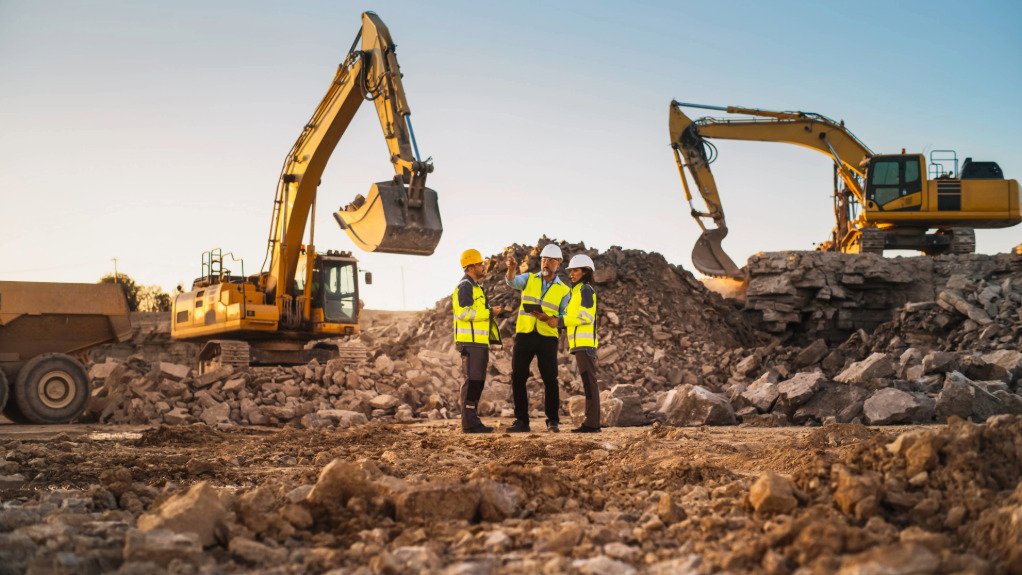Contractors, sub-contractors battling as late payments accelerate – MBA North
The construction industry value-chain is at risk of collapsing as shrinking margins, unfair practices and payment issues continue to undermine the sector.
This is according to members of the Master Builders Association (MBA) North, who warn that “urgent dialogue and change” are needed to address industry issues and avoid further job losses and bankruptcies.
“The industry is bleeding – it’s in dire straits,” says MBA North executive director Mohau Mphomela.
“Stakeholders need to use the power of associating and association – form a united front – and stand together to take action.”
MBA North members report that the single biggest challenge facing the sector is ongoing payment delays, as well as non-payment.
This situation has worsened in recent years, eating into companies’ financial reserves and putting businesses at risk.
Smaller businesses, sub-contractors and contractors are most vulnerable to payment issues, which have a ripple effect up and down the value chain.
MBA North members say that sub-contractors are frequently “forced to wait months, or even years, for payment”.
Wanda Merrington, an MBA North member from Combined Flooring, notes that liquidations and changes in the sector in the past few years mean that up to 80% of the contract value is now carried out by sub-contractors.
“Years ago, principal or main contractors employed most of the skills required on a contract in-house. But, it’s not like it was ten years ago, when we had major multinationals with strong cashflows and large workforces.”
“Many of the first-tier contractors have gone into liquidation, so the second tier has moved up, using subcontractors to get the work done and being the holder of the funds,” explains Mphomela.
However, many of these contractors may lack the experience, resources and cash reserves the multinational contractors had.
Merrington notes that sub-contractors must wait for final completion or works completion before being paid in full, something which could take a long time – in some instances, “many years”.
Neil Duncan, past president of MBA North and chair of the MBA North sub-contractor sub-committee says payment issues are not just a sub-contractor problem.
“It’s an industry problem. If a main contractor gets into financial trouble by virtue of a contract going sour, or through poor performance on his part, it impacts the entire industry – suppliers and main contractors, and hugely on subcontractors.”
Another past president of MBA North, Nico Maas of Gauteng Piling, says his company has lost more than R9-million in income in recent years, with outstanding debt of R11-million because of non-payment.
“We’re a small company with 22 permanent employees. Our very survival is threatened.
“A solution to the retention monies being withheld by main contractors, is that the money be paid into a retention fund, which is held by the fund holder until the contract is signed off by the client’s agent,” notes Maas.
“The Federated Employers Mutual Assurance Company has such a fund, and is widely used by members of the Electrical Contractors Association.”
Maas suggests that retention monies in all forms can be paid into this fund – even retentions being withheld by client bodies on main contractors.
“This will safeguard the main contractors should the client go out of business, which has also been happening more and more lately,” he says.
Uwe Putlitz, former CEO of the Joint Building Contracts Committee (JBCC), points to contracts and a lack of best practice as key factors influencing these payment challenges.
“Sub-contractors must conduct due diligence on prospective clients, and should insist on industry recognised contracts that are fair to both parties,” he says.
“This contract should be transparent, fair, and fully detail the entire agreement, variables and penalties.”
MBA North members say that JBCC standard-form contracts, which have been drafted over the past 50 years to ensure all role-players are treated fairly, are sometimes unilaterally amended and adapted in such a way that risk is transferred from clients and developers to sub-contractors.
Members also note that many contractors and sub-contractors sign contracts they do not fully understand, or which put their businesses at risk, simply to bring in much-needed business.
“Sub-contractors should stay closely in touch with the financial management of prospective clients,” notes Duncan.
“There’s never smoke without a fire, so they should do their homework on financials and payment records of both the main contractors and the clients. They should also not accept contracts and amendments without giving them careful consideration. If you are going to debate anything, you need to do it before you sign the contract.”
“‘Next job syndrome’ is a challenge,” adds Mphomela.
“Members are signing unfair contracts and committing to illegal practices to avoid losing out on future opportunities. They fear they will lose opportunities and be prejudiced against in future jobs if they don’t agree to contract terms.”
Mphomela says MBA North has issued a practice note recently, where members pledged to counter unfair business practices.
“We call on members to follow through and hold to this agreement. As an association, the time has come to say enough is enough.
“We must present a united front to demand adherence to ethical practices to the benefit of all stakeholders.”
Article Enquiry
Email Article
Save Article
Feedback
To advertise email advertising@creamermedia.co.za or click here
Press Office
Announcements
What's On
Subscribe to improve your user experience...
Option 1 (equivalent of R125 a month):
Receive a weekly copy of Creamer Media's Engineering News & Mining Weekly magazine
(print copy for those in South Africa and e-magazine for those outside of South Africa)
Receive daily email newsletters
Access to full search results
Access archive of magazine back copies
Access to Projects in Progress
Access to ONE Research Report of your choice in PDF format
Option 2 (equivalent of R375 a month):
All benefits from Option 1
PLUS
Access to Creamer Media's Research Channel Africa for ALL Research Reports, in PDF format, on various industrial and mining sectors
including Electricity; Water; Energy Transition; Hydrogen; Roads, Rail and Ports; Coal; Gold; Platinum; Battery Metals; etc.
Already a subscriber?
Forgotten your password?
Receive weekly copy of Creamer Media's Engineering News & Mining Weekly magazine (print copy for those in South Africa and e-magazine for those outside of South Africa)
➕
Recieve daily email newsletters
➕
Access to full search results
➕
Access archive of magazine back copies
➕
Access to Projects in Progress
➕
Access to ONE Research Report of your choice in PDF format
RESEARCH CHANNEL AFRICA
R4500 (equivalent of R375 a month)
SUBSCRIBEAll benefits from Option 1
➕
Access to Creamer Media's Research Channel Africa for ALL Research Reports on various industrial and mining sectors, in PDF format, including on:
Electricity
➕
Water
➕
Energy Transition
➕
Hydrogen
➕
Roads, Rail and Ports
➕
Coal
➕
Gold
➕
Platinum
➕
Battery Metals
➕
etc.
Receive all benefits from Option 1 or Option 2 delivered to numerous people at your company
➕
Multiple User names and Passwords for simultaneous log-ins
➕
Intranet integration access to all in your organisation





















